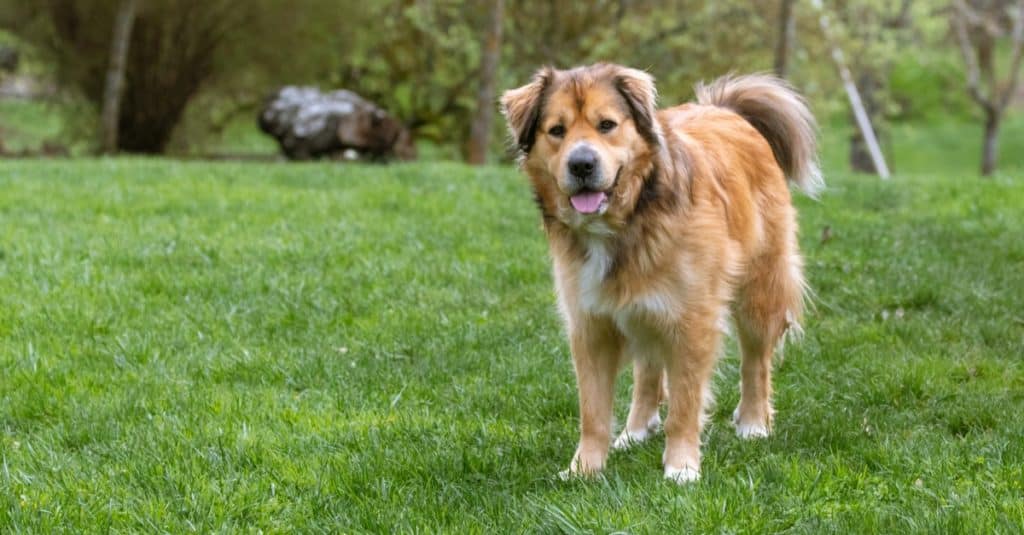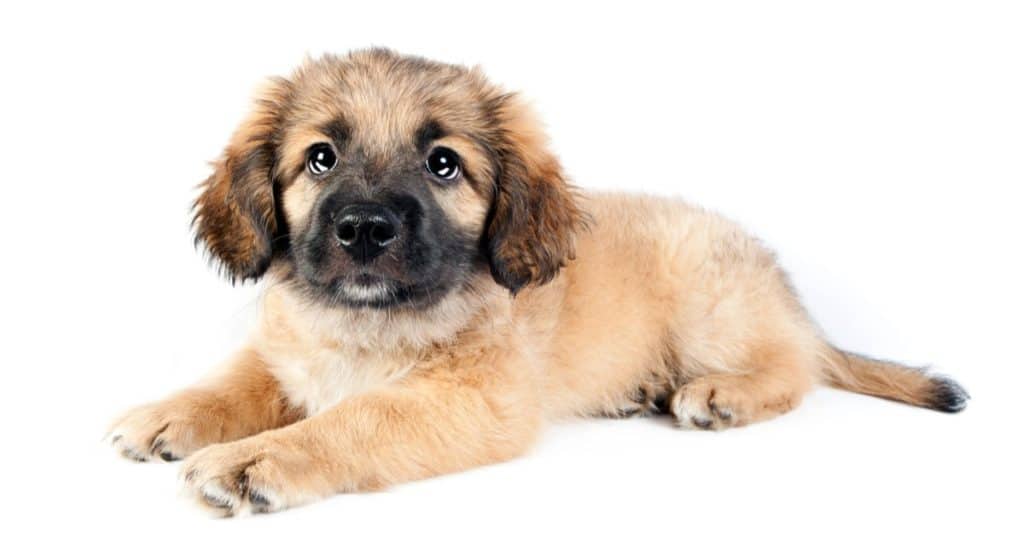Golden Shepherd
Canis lupus
The Golden Shepherds were first recognized by the International Designer Canine Registry in 2009.
Advertisement
Golden Shepherd Scientific Classification
- Kingdom
- Animalia
- Phylum
- Chordata
- Class
- Mammalia
- Order
- Carnivora
- Family
- Canidae
- Genus
- Canis
- Scientific Name
- Canis lupus
Read our Complete Guide to Classification of Animals.
Golden Shepherd Conservation Status
Golden Shepherd Facts
- Fun Fact
- The Golden Shepherds were first recognized by the International Designer Canine Registry in 2009.
- Temperament
- Friendly, loyal, and intelligent
- Diet
- Omnivore
Golden Shepherd as a Pet:
- General Health
- Energy Level
- Shedability
- Trainability
- Intelligence
- Tendency to Chew
- Size
- Family and kid friendliness
- Yappiness / Barking
- Moderate
- Separation Anxiety
- High
- Preferred Temperature
- Average climate
- Exercise Needs
- Moderate
- Friendly With Other Dogs
- High
- Pure bred cost to own
- $300 to $1,000
- Dog group
- Non-sporting
- Male weight
- 75-80 lbs
- Female weight
- 55-60 lbs
This post may contain affiliate links to our partners like Chewy, Amazon, and others. Purchasing through these helps us further the A-Z Animals mission to educate about the world's species.
View all of the Golden Shepherd images!
With its strong heritage, the Golden Shepherd makes for an excellent watchdog, service dog, and overall companion and friend.
The Golden Shepherd is an eclectic mix between a Golden Retriever and a German Shepherd. Both breeds have a fascinating history. The Golden Retriever was originally bred in the Scottish Highlands as an exuberant gundog that would find and retrieve game. The German Shepherd descended from large German herding dogs in the 19th century. Its incredible combination of intelligence, athleticism, and speed has served all kinds of purposes, from police work to search and rescue. It was also used in both world wars.
See all of our expert product reviews.
The Golden Shepherd inherits attributes from both breeds, including the loyal and friendly personality, the muscular, athletic body, and the dense coat of medium to long fur. This coat can be rough like a German Shepherd or soft and smooth like the Golden Retriever. Despite the name of this hybrid, it actually comes in several colors, including black, white, gold, cream, blue, gray, tan, and sable.
3 pros and cons of owning a Golden Shepherd
| Pros! | Cons! |
|---|---|
| Loyal and Protective The Golden Shepherd forms a strong bond with its owner. | Easily Bored The Golden Shepherd needs constant activity and companionship. |
| Intelligent and Trainable This dog can be trained to perform a huge variety of different tasks. | High Maintenance This dog requires a lot of time and effort to care for. |
| Energetic and Athletic This dog is a great exercise companion; it’s also capable of performing complex tricks and sports. | Needs Plenty of Space This is not a good apartment dog. It benefits from a larger home. |

©Catherine Avilez/Shutterstock.com
Golden Shepherd Size and Weight
The Golden Shepherd is a large, muscular dog. Males tend to be quite a bit larger than females on average.
| Height (Male) | 23 to 25 inches |
| Height (Female) | 17 to 20 inches |
| Weight (Male) | 75 to 80 pounds |
| Weight (Female) | 55 to 60 pounds |
Golden Shepherd Common Health Issues
Despite being generally healthy, the Golden Shepherd always has the chance to inherit several health problems from its two parent breeds, including allergies, heart disease, cancer, epilepsy, eye conditions, and endocrine diseases like diabetes. Another potentially serious problem to look out for is Von Willebrand’s disease, a bleeding disorder that results from low levels of clotting protein in the blood.
Like its German Shepherd and Golden Retriever parents, the Golden Shepherd is also prone to hip and elbow dysplasia. These developmental disorders may either be due to a failure of these joints to develop properly or as a result of the bones failing to fit together perfectly.
Health and Entertainment for your Golden Shepherd
See all of our expert product reviews.
Because neither condition is reversible it is best to be vigilant. You will need to work out a special diet and exercise plan with your vet. Special food must be given to your pup to prevent rapid development which may in turn cause extra strain to be placed on its hip and elbow joints. Lack of sufficient exercise and overfeeding may also cause extra strain on your pet’s joints increasing the risk of problems in the future.
Finally, owners need to be aware of bloating, a very serious condition that can cause the stomach to expand rapidly if the dog eats too quickly. Some of these conditions have a strong genetic component that can be minimized through good breeders, but problems will always arise, no matter how healthy the dog seems.
In order to catch these problems early, it is always recommended to schedule regular checkups with your vet for tests and a physical examination. A healthy Golden Shepherd will usually have a lifespan of 10 to 14 years. In summation, these are the most common health problems of the Golden Shepherd:
- Allergies
- Hip and Elbow Dysplasia
- Heart Disease
- Eye Conditions
- Cancer
Golden Shepherd Temperament
The Golden Shepherd has an outgoing, upbeat, and friendly personality that should get along well with almost everyone. There is a chance it may inherit a wariness of strangers from its German Shepherd parent, but once it makes friends, this dog is a loyal and protective companion and even an excellent watchdog. Sometimes they can be a little over-protective and will anxiously check up on each member of the family.
This antsy and restless trait is another issue you will have to deal with. If left alone for too long or ignored by its owner, then the Golden Shepherd can become anxious and bored, which may lead to destructive and unwanted behavior. This is why owners should supply its dog with plenty of activities to do. As a result, this dog does best in larger homes with plenty of space to roam in.
How to Take Care of the Golden Shepherd
The Golden Shepherd is a medium to high maintenance dog. Since it requires a great deal of hard work and attention caring for, this dog does best with an experienced owner. However, even novice and first-time owners can learn how to take care of this dog with enough time and effort. If you have any other questions or concerns about your dog’s care, then you should consult with your vet.
The Best Dog Food for Golden Shepherds
A fully grown Golden Shepherd will probably need between 3 and 5 cups of high-quality dry food per day. The exact amount will depend on the dog’s age, size, and activity level. If your dog is prone to bloat, then you might want to use a slow feeder bowl or divide up the meals into several per day. Avoid timing meals and exercise too close together as well.
If the dog starts to show signs of allergic reactions or gastrointestinal symptoms, then you should adjust the diet and try to find a food that works. Also be mindful of this breed’s propensity for heart disease. At regular vet visits, discuss your dog’s heart health, and the benefits of legume-free dog foods, since legumes are linked to heart failure in dogs.
At A-Z Animals we recommend Natural Balance Limited Ingredient Diet | Large-Breed Adult Dry Dog Food with Healthy Grains as the best dog food for Golden Shepherds.
This nutrient-dense and gluten-free large breed diet cuts out ingredients like corn, soy, wheat, and legumes. Instead, there are only premium ingredients like lamb and brown rice, alternative yet healthy alternative protein and carbohydrates for complete nutrition. There’s an abundance of protein, plus taurine to help safeguard your dog’s eyes as well as their heart.
Check Chewy or Amazon for this product.
- Crafted with 8 key ingredients, starting with real salmon.
- Grain-free freeze-dried kibble raw coated with real salmon for the wag-worthy taste dogs love.
- The small kibble size is specially designed for petite puppies.
- Contains omega-6 and -3 fatty acids to promote healthy skin and a lustrous coat.
- Good for pets, people and the planet.
Golden Shepherd Maintenance and Grooming
With its heavy and frequently shedding coat, the Golden Shepherd needs to be groomed with a simple pin brush around two to three times a week, although these brushing sessions may need to occur almost daily during the heavy shedding seasons of the spring and fall. The coat generally keeps clean and should only be bathed as necessary whenever the dog becomes particularly dirty. Proper dental hygiene should be maintained with simple dental chews and regular teeth brushings at least a few times a week. Finally, you should trim the nails with a clipper and clean the ears with cotton whenever necessary.
Golden Shepherd Training
The Golden Shepherd is a very trainable and eager to please dog that strives to obey all of its owner commands. It responds best to a firm and strong leader who employs a consistent and predictable training method. Owners should try to set consistent boundaries and rules for the dog to follow, and then communicate as clearly as possible when the dog is doing something wrong with a calm and dispassionate tone.
It is not a good idea to act aggressively toward your dog. In fact, owners should strive to be positive and upbeat; offer it plenty of treats and praise when it does something right. Fortunately, this dog isn’t too stubborn or belligerent, and it grasps commands very quickly. If you are struggling to maintain a consistent process, then you might want to consider taking your dog to see a professional trainer.
Golden Shepherd Exercise
The Golden Shepherd is a highly active dog that requires at least 45 minutes of exercise per day; otherwise, if it doesn’t receive enough playtime, it might become bored and anxious. This dog will enjoy an adequate amount of long walks or runs on a leash, combined with the ability to roam freely in a large yard or park near your home. Indoors, you should have plenty of chew toys and balls available for it to play with. The Golden Shepherd also excels at all types of tricks, agility competitions, and sports.
Golden Shepherd Puppies
Golden Shepherd puppies need to be trained from an early age to prevent them from developing some bad anti-social tendencies as an adult. Owners should preferably start puppies on obedience training, house training, and, if necessary, crate training within the first six months of its life. Owners should also attend to the puppy’s physical development; their bodies may be sensitive to running and jumping until about 18 months of age, so you should limit their exercise at first to slow walks and playtime on soft surfaces.

©Natalia7/Shutterstock.com
Golden Shepherds and Children
Despite its size, the Golden Shepherd should be kind and gentle to even the smallest children. Once it accepts them as part of the family, the dog will exhibit a loyal and protective behavior toward them. But even so, it is rarely a good idea to leave dogs unsupervised alone with smaller kids unless an adult is present.
Dogs Similar to the Golden Shepherd
Besides the Golden Retriever and German Shepherd parents, the Golden Shepherd is similar to the following types of dogs:
- Labrador Retriever – As the most popular breed in the United States, the Labrador Retriever is beloved for its friendly, outgoing, and upbeat temperament and its playful, athletic nature. The dense coat comes in three different colors: black, chocolate, and yellow.
- German Sheprador – A cross between a Labrador Retriever and a German Shepherd, the Sheprador is an excellent companion and watchdog. Friendly, loyal, and eager to please, it will form a lifelong bond with its owner.
- Goldador – Good-natured, loyal, and affectionate, the Goldador is a mix between a Golden Retriever and a Labrador Retriever. Although a great companion and friend, it does require a lot of time and commitment on the part of its owner.
Famous Golden Shepherds
There aren’t many examples of famous Golden Shepherds in wider popular culture, but both of its parent breeds are consistently ranked among the top five most popular in the United States. German Shepherds have been featured prominently on TV and film, including the famous canine actor Rin Tin Tin.
Popular Names for the Golden Shepherd
If you are struggling to find a good name for your Golden Shepherd, then you might want to consider one of these options:
- Charlie
- Bella
- Cooper
- Daisy
- Max
- Luna
- Zeus
- Rocky
- Athena
- Bear
Golden Shepherd FAQs (Frequently Asked Questions)
What is a Golden Shepherd?
A Golden Shepherd is a cross between a Golden Retriever and a German Shepherd. It combines many appealing aspects (and some less than appealing aspects) of both breeds, including an intelligent mind, an athletic body, and a friendly and loyal bearing. These are big dogs with a variety of different coat colors and hair types, although black, white, and brown are most common.
How much is a Golden Shepherd?
The cost of a Golden Shepherd is usually between $300 and $1,000. Dogs with a particularly strong pedigree and lineage will tend to cost a lot more than average. But dogs adopted from a shelter or rescue will tend to be much cheaper in price. Regardless, it is always recommended to buy from a reputable breeder or trusted organization.
Are Golden Shepherds good dogs?
That depends on what type of dog you are looking for. The Golden Shepherd is a very versatile and friendly hybrid with many different uses as a companion, watchdog, or service dog. However, owners should be prepared to meet the challenges of caring for this dog’s demanding physical, mental, and emotional needs, which will require time, patience, effort, and money.
Are Golden Shepherds rare?
As a mixed designer dog, the Golden Shepherd is relatively uncommon. It might be hard though not impossible to find a breeder or shelter in your area that carries these types of dogs. They will also sometimes show up at a German Shepherd or Golden Retriever-specific rescue group.
Thank you for reading! Have some feedback for us? Contact the AZ Animals editorial team.
Sources
- Doggie Designer, Available here: https://doggiedesigner.com/golden-shepherd/
- Wag Walking, Available here: https://wagwalking.com/breed/golden-shepherd


















